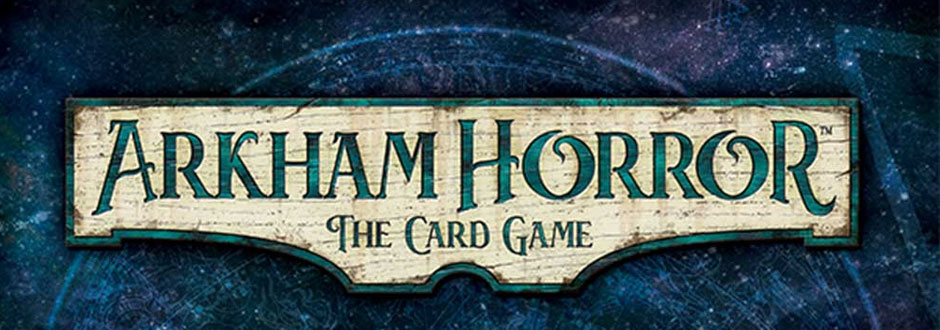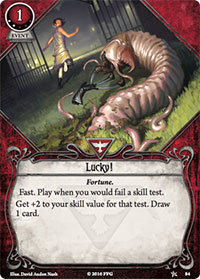Ever since Fantasy Flight Games first announced Arkham Horror: The Card Game, a Lovecraftian themed game in the Living Card Game (LCG) format, I had been interested. I have had a load of fun playing Eldritch Horror, and the idea of a more compact game in that vein - co-operative to boot - was too good a concept to pass up.
Before we dive into the meat of this we need to get one thing out of the way: you should play this game without reading any spoilers at all. I am going to avoid scenario spoilers completely in my review, and I suggest when you open your game that you do not look through all the scenario cards. Doing so will spoil some enjoyment of the game. Let's delve deep.
Deciphering The Signs
A little explanation of this idea is probably worth it before going any further. The Living Card Game, or LCGs, are Fantasy Flight Games' answer to the problem with the collectable card games, or CCG, model. The CCG model tends to revolve around a rarity system, where some cards are harder to get than others.
People then buy cards in booster packs, where they know they will get a rare, some uncommon etc, but don't know exactly what cards they will get. This means to play competitively you have to throw down some fairly serious money.
LCGs do away with the randomness completely. You buy a starter set with a fixed number and a selection of cards in it. Then every month or so a new 'pack' comes out with around 15 new cards, and enough copies of each to put in your deck.
However, unlike the CCG model you know exactly what cards are in each pack and starter set, there is no 'rare chasing' as you see in Magic and the like. The slight issue here is that if you want a full playset, enough of every card to put in a deck, you usually need to buy more than one core set.
Both of these models do mean that you will be doing a little work after opening up your game, in that you'll need to build your own deck.
If that concept puts you off, don't worry. There are plenty of resources to get ideas for decks and I am sure you will see the benefit of moulding your own particular deck as you get more familiar with Arkham Horror: The Card Game.
Opening An Ancient Tome
Arkham Horror: The Card Game is a fascinating mash-up of LCG concepts with an RPG underlay. A thrilling ride into the heart of madness as you try and prevent the world from falling to the Mythos. Cracking open the box you are greeted by several packs of beautifully illustrated cards and a bunch of chunky tokens, typical FFG excellent quality. A learn to play guide sits on top of the Rules Reference and you can dive straight in with the former, following its excellent instructions on how to build your first two decks.
First of all, you split these decks of cards into two separate piles. All the ones to do with building your decks, the character cards, and all the ones that the game is going to use to cause you trouble - which includes location, act, agenda and encounter cards. Do your very best not to look at any of this second set of cards until they are in play, your first experience with the game will be all the better for it.
Roll With The Punches
Arkham Horror: The Card Game sees you taking on the role, and I really do mean that, of an investigator in the strange little town of Arkham, Massachusetts. Things are going bump in the night and for one reason or another, you and your fellow players have decided to venture out and figure out what is going on. The two decks the game sets you off into the unknown with are Roland Banks, the Fed, and Wendy Adams, the Orphan. Each of these characters comes with their own character card, a mini card to show their position in the scenario, and a few cards unique to them. We will come back to those momentarily.
Following the instructions in the Learn to Play guide, you will throw two decks together. Each investigator fits into a class: Guardian, Survivor, Seeker, Mystic, and Rogue. The intro decks see you putting together a Guardian/Seeker deck for Roland and a Survivor/Rogue deck for Wendy. Each class has its own particular specialisations and frankly, I'm not going to spoil those for you as I am sure you will find the class(es) that suit you best.
Alongside the class cards, you will put some neutral cards in that have no class affiliation. Lastly, the most important cards. I've already touched upon that each deck is an actual character in the game and it's these final cards that really drive that point home. On the back of each character card is a little story as to how they got involved in the investigations into the Mythos. Roland is a fed, so is looking into things in an official capacity.
Unfortunately, this means he has instructions to keep everything on the down-low and his signature weakness 'Cover up' reflects this. On the other hand, he hasn't come without being prepared for the worst, and his guns are some of the best in the box. Unfortunately, you also get another weakness alongside the signature one.
Although this only amounts to three cards out of a 33 card deck, you will come to hate them like nothing else. During the game, whenever you draw a weakness from your deck you have to reveal it and resolve it. Roland's basically means that he has to go and burn some evidence somewhere. If you don't succeed by the end of the scenario, Roland is going to have to wrestle with failing at his job for the rest of the game, taking permanent mental damage through the subsequent scenarios. The basic weakness that the starter deck gives you on top of that means he loses all his resources, the currency you use to do EVERYTHING in the game. So yeah, they suck.
It Was A Cold, Dark Night...
You have your decks ready to go. Now it's time to venture into the cold, dark night. The core set of Arkham Horror: The Card Game contains a campaign called Night of the Zealot and three scenarios. You will start in the house of the lead investigator. Suddenly, you are trapped in his study! You desperately search for a way out when... okay, let's stop there. Seriously, I can't say anymore without spoiling things for you.
Each scenario is a selection of location cards that the characters can move around. Each card has two sides so that the game can make you guess which version of a particular location is in play. On top of this is an encounter deck that you will be drawing from frequently. These encounters could be monsters, traps, or... Spoilers. The real driving force behind each scenario is the Agenda and Act deck. As each scenario opens, you will read a bit of intro text to get your characters on the same page. The top card of the Agenda and Act deck will also be read, telling you what the forces of evil are up to and how you can stop it. The final piece of setup is the card that tells you about all the symbols in the chaos bag.
The Chaos Bag is a beautiful piece of design that really sets this game apart. Rather than rolling a dice, or pulling a card to resolve skill tests, you pull a token from the bag and add it to your skill to compare to the target number. This sounds rather pedestrian, but the beauty of the chaos bag is that the difficulty can be altered by removing one token and adding another. The special symbols can do different things depending on the scenario, leaving a lot of room for variety. Who knows, over the course of a campaign you may even find that the bag changes!
Over the course of the scenario, Doom will slowly accumulate on the agenda. Investigators will accumulate clues and defeat the things that go bump in the night, getting them one step closer to the conclusion. They must achieve this before they lose their minds... or their lives.
The way the cards interact with each other is a delightful experience, with surprises around every corner. The design team really shows you what they can do with the space they have built. You will find each scenario can be completed in a variety of ways, and what you do in one scenario affects the next.
On top of this, each scenario will expose your character to the horrors of the mythos and leave them better prepared for what is to come. This manifests itself in experience which can be used to change the cards in your deck. Maybe Wendy will upgrade the Lucky card in her deck for a better version, or perhaps Roland could really do with a Police Badge.
Although there are only three scenarios in the core, I have played through them multiple times and each one has felt like a well defined, interesting story. That is what this game delivers in spades. The co-op game lying at the core is great but more than that each attempt at this particular campaign feels like its own self-contained story, no matter what happens.
This Is Not The End Of Your Tale
Of course, the LCG format does mean that you will see a lot of content coming out for Arkham Horror: The Card Game. First off, I would say that the core set is a really solid experience all on its own. It has plenty of replayability if you just want to get a taste of the game. If you really enjoy it and want to build more consistent decks, you are going to want a second copy of this core set. A bit of an investment, but worth it if you want more of the deckbuilding side of the game.
However, should you want to go further, you can delve into the Mythos with the now complete Dunwich Legacy. Starting with a new core set of the same name it introduces five new investigators (one for each class), a bunch of new investigator cards, and the two new scenarios. Where the core set gives you a taster of what the designers are capable of, the two in this set blew my mind.
After this core box of Arkham Horror: The Card Game, there is a multitude of new expansion packs, each containing a slew of new cards for your Investigator deck and a new scenario. I will be reviewing some of these packs separately, but I can tell you that I loved every minute and have swung back around for another go with different decks and at a harder difficulty.
Final Thoughts On Arkham Horror: The Card Game
I have been immensely impressed with Arkham Horror: The Card Game. The rule books are some of the best that FFG has produced, and I would be the first to call them to task for such things. The cards and tokens are absolutely gorgeous. The designers have created a fascinating design space that they can now play with, and they are definitely having fun with that space.
Arkham Horror: The Card Game is a huge amount of fun. With emergent stories, great decisions, and fascinating design philosophy. The Core Set is a strong start for a game that has gone from strength to strength and shows no signs of slowing down.
Editors note: This blog was originally published on August 23rd, 2017. Updated on October 27th, 2021 to improve the information available.









Share